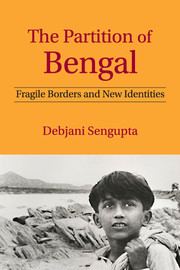Book contents
- Frontmatter
- Dedication
- Contents
- Acknowledgements
- Introduction
- 1 The Calcutta Riots in Representations and Testimonies
- 2 Noakhali and After: History, Memory and Representations
- 3 Colony Fiction: Displacement and Belonging in Post-Partition Bangla Fiction
- 4 From Dandakaranya to Marichjhapi: Refugee Rehabilitation in Bangla Partition Fictions
- 5 The Partition's Afterlife: Nation and Narration from the Northeast of India and Bangladesh
- 6 Uncanny Landscapes and Unstable Borders: Politics and Identity in Geo-Narratives of the Partition (2005–10)
- Bibliography
- Index
6 - Uncanny Landscapes and Unstable Borders: Politics and Identity in Geo-Narratives of the Partition (2005–10)
Published online by Cambridge University Press: 18 December 2015
- Frontmatter
- Dedication
- Contents
- Acknowledgements
- Introduction
- 1 The Calcutta Riots in Representations and Testimonies
- 2 Noakhali and After: History, Memory and Representations
- 3 Colony Fiction: Displacement and Belonging in Post-Partition Bangla Fiction
- 4 From Dandakaranya to Marichjhapi: Refugee Rehabilitation in Bangla Partition Fictions
- 5 The Partition's Afterlife: Nation and Narration from the Northeast of India and Bangladesh
- 6 Uncanny Landscapes and Unstable Borders: Politics and Identity in Geo-Narratives of the Partition (2005–10)
- Bibliography
- Index
Summary
My memory is again in the way of your history.
Agha Shahid Ali, FarewellEdward Said has alerted people to the fact that the imagination of anti-imperialism has an inherent geographical element:
For the native, the history of colonial servitude is inaugurated by the loss of the locality to the outsider: its geographical identity must thereafter be searched for and somehow restored. Because of the presence of the colonizing outsider, the land is recoverable at first only through the imagination.
However, this symbolic recovery of the land on the part of a colonial/postcolonial subject is deferred in the case of Bengal because colonialism's end ushers in a partition of the very land that needed to be imaginatively recreated and restored. The history of dispossession and dislocation that partition brings in its wake is corroborated and memorialized by the works of literature of belonging and habitation in Bengal (both in West Bengal and Bangladesh) that form a distinct body of literary work. The history they chart is not the history of the nation's progression from colonialism to independence but embedded within it as another history: the accounts of the day-to-day life of those people who are ‘outside’ the realm of that history: the religious/ethnic minorities of the nation. Whether it is in India or in Pakistan, many of them did not leave their homes in 1947 or perhaps their ‘homes’ were reconfigured by the vagaries of the arbitrary borders. If the nation is not just a sovereign space but also ‘imagined communities’ as Benedict Anderson suggests, then what does it mean to imagine oneself intothe nation especially if one's location is outside it? As a Muslim living in India or a Hindu in Bangladesh, how does one imagine one's national belongingness? In what ways can identity be fashioned by moving or staying in a particular place? Can that place be called ‘home’ even when history intervenes to say one does not belong there? In Bengal's partition fiction, geography becomes deeply implicated in history and politics: the bio-geo-political implications of being a refugee or a minority in a land where one no longer belongs is fraught with issues of livelihood, homelessness and citizenship.
- Type
- Chapter
- Information
- The Partition of BengalFragile Borders and New Identities, pp. 220 - 250Publisher: Cambridge University PressPrint publication year: 2015



